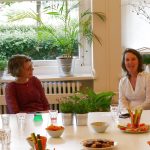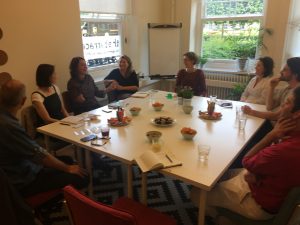On Tuesday, May 23, 2017, The Terrace hosted a diverse group of people to talk about plastic waste and the circular economy. The evening kicked off with an interview with Leontine Gast, founder of The Terrace, followed by a roundtable discussion on plastic waste in our lives, led by Nelmara Arbex, CEO of Arbex & Company.
The past and future of plastic
Leontine Gast is an expert on bringing purpose to business. At this event, she was interviewed by her colleague Marjolein Baghuis. Leontine has worked in sustainability for over two decades, including ten years as the founder and managing director of The Terrace, the agency for positive change. She has contributed to a more circular economy through her work with companies and other types of organizations. Her top tips from that experience regarding plastic waste target both users and producers of products that contain plastics. Consumers need to be much more aware; once they really understand what they are buying, they will make different choices. Producers need to continue to pioneer solutions and share their learnings. Not just solutions related to waste streams, but also as early as product design; i.e. with design for disassembly such as Ahrend’s vision on office furniture. For the years ahead, one of Leontine’s dreams is that we’ll find a way to consume and produce less stuff – and better stuff – including a reduction in the amount of plastic we create. Other dreams include the transition to renewable energy and a switch to a more plant-based diet.
is an expert on bringing purpose to business. At this event, she was interviewed by her colleague Marjolein Baghuis. Leontine has worked in sustainability for over two decades, including ten years as the founder and managing director of The Terrace, the agency for positive change. She has contributed to a more circular economy through her work with companies and other types of organizations. Her top tips from that experience regarding plastic waste target both users and producers of products that contain plastics. Consumers need to be much more aware; once they really understand what they are buying, they will make different choices. Producers need to continue to pioneer solutions and share their learnings. Not just solutions related to waste streams, but also as early as product design; i.e. with design for disassembly such as Ahrend’s vision on office furniture. For the years ahead, one of Leontine’s dreams is that we’ll find a way to consume and produce less stuff – and better stuff – including a reduction in the amount of plastic we create. Other dreams include the transition to renewable energy and a switch to a more plant-based diet.
Sharing issues and questions on plastic waste
 After the interview, Nelmara Arbex led a roundtable discussion on plastic in our lives. We all agreed that there is a role for plastic is our lives (to protect food, to store cosmetics, etc), but that its use had really gotten out of hand. For all of us, our awareness of the plastic problem started with an eye-opening moment. Bananas individually wrapped in plastic, bottled water in countries with excellent tap water, plastic littered beaches, a shampoo bottle in the middle of the jungle. But also by simply separating plastic from the other household waste, and being shocked that this was more than half of our waste. We shared our ways to avoid plastic waste as much as possible, such as:
After the interview, Nelmara Arbex led a roundtable discussion on plastic in our lives. We all agreed that there is a role for plastic is our lives (to protect food, to store cosmetics, etc), but that its use had really gotten out of hand. For all of us, our awareness of the plastic problem started with an eye-opening moment. Bananas individually wrapped in plastic, bottled water in countries with excellent tap water, plastic littered beaches, a shampoo bottle in the middle of the jungle. But also by simply separating plastic from the other household waste, and being shocked that this was more than half of our waste. We shared our ways to avoid plastic waste as much as possible, such as:
- Bring your own bags to the supermarket, even for fresh produce;
- Carry your own reusable water bottle and coffee mug;
- Making more food and other household items from scratch;
- Collecting plastic waste separately;
- Influencing peers to start recycling plastic.
We also shared the many questions we had regarding plastic. For some we found answers (in italics), others remain unanswered, such as:
- Can biodegradable plastics be recycled with other plastics? No, please put them with your organic waste.
- How much plastic is recycled in our city (Amsterdam) and what actually happens to it? Amsterdam’s citizens collect only 8% of plastics separately. After sorting, cleaning, and shredding, recycled plastic are turned into new products like fleece sweaters, toys, furniture, and pipes.
- Why are the ingredients for food and clothing spelled out in detail, but those for packaging nowhere to be found?
- Where can I buy groceries without superfluous plastic packaging?
- How to balance food waste with plastic packaging to keep it fresh longer?
Supporting behavior change beyond rules and regulations
We also wondered what kind of regulation exists on packaging. New EU legislation is on its way, but we also realized that rules and rational information alone will not change our behavior. We need to appeal to emotions, feelings, and instincts in people to help drive change. Some of our recommendations include:
- Teach sustainability as a topic in school at every level;
- Make it easy and practical for consumers, retailers, and manufacturers to reduce, reuse and recycle plastics, potentially through interactive apps to support recycling or to help you find places to shop with less packaging;
- Label products not only with calories and food content but also with a waste indicator to make people aware;
- Leverage emotional storytelling on plastic waste to generate more awareness;
- Ask CEOs to live without plastic for a week and to share their learnings publically;
- Involve celebrities to make it aspirational to turn your back on today’s throwaway culture.
It was great to meet like-minded people at this event. All with a strong belief that we can have an impact, each with a strong personal motivation to create positive change!
This blog was written by Marjolein Baghuis (@MBaghuis) to share the outcome of the roundtable discussion on the OpenIDEO platform. It also appears on the website of The Terrace. To read about interesting people, book reviews and other posts about sustainability, change, and communications please subscribe to the Change in Context blog.
